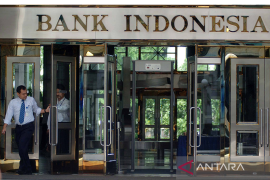"The foreign currency reserves at present reach US$114 billion which is quite secure to deal various possibilities in the future," Bank Indonesia`s director for economic research and monetary policy Perry Warjiyo said here on Saturday.
He said BI continued with its measures to overcome volatility in the exchange rate of the country`s rupiah currency including stabilizing financial market, buying government bonds from foreign investors and pushing the real sector to move.
Perry said in the past two months short-term foreign investors did withdraw their funds initially invested in Indonesia such as in the state securities (SBN), shares and Bank Indonesia Certificates (SBI).
He said foreign ownership of SBN reached around 35 percent of total SBN value at Rp236 trillion but later it dropped to only around 31 percent.
He admitted there had been a decline in the rupiah exchange rate recently but the depreciation was still higher than that in other countries.
The rupiah depreciation since the end of last year reached 1.6 percent while that of the Malaysian ringgit to 4.0 percent and Thai baht to 4.5 percent.
SBN purchases by BI so far have reached Rp64 trillion compared to Rp30 trillion before. The SBNs bought by BI were the ones sold by foreign investors.
To boost the real sector Perry said BI had cut its key interest rate to 6.0 percent from formerly 6.50 percent.
The exchange rate of the rupiah dropped 110 points on Friday following the depreciation of Asian currencies due to debt crisis in Europe.
On Friday afternoon the rupiah exchange rate against the US dollar moved down 110 points to Rp9,000.
Economic observer from the Catholic University of Atmajaya, A Prasentyantono, predicted the country`s economic growth in 2012 would rely on domestic sources due to the impact of the current global crisis.
"Indonesia will continue preparing anticipatory measures. The financial sector is a sensitive sector. So funds must be made ready for buybacks if case capital outflows occur," he said.
He said the domestic sector must be strengthened including improving spending, infrastructure and others.
"Budget use especially capital expenditures must be improved as from year to year they have become weak," he said. (*)
Editor: Aditia Maruli Radja
Copyright © ANTARA 2011











